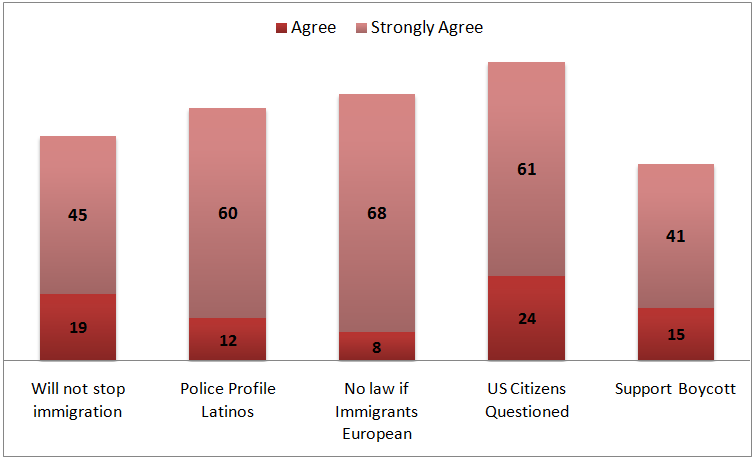In the days and weeks following Governor Jan Brewer’s national press conference where she signed SB1070 into law, because “it is best for Arizona”, organizations, municipalities and private citizens around the country responded in kind. Officials in Austin, Texas, St. Paul, Minnesota and Los Angeles, California (among others) announced official boycotts in opposition to the new policy. Individuals and groups canceled travel plans to the state, and some college students opted for universities outside of Arizona. Market response to SB1070 has been swift and consequential, unlike the partisan political reaction that remains relegated to posturing and rhetoric.
It did not take long for state officials to recognize that racial controversy is bad for business (also see Arizona 1987-1992, 166 lost conventions and a Super Bowl in response to their rejection of Martin Luther King, Jr. Holiday). Last week Governor Brewer announced a state task force charged with re-branding Arizona’s image in the hopes of mitigating the mounting losses, already estimated at $90 million. The state has allocated a quarter of a million dollars to the Arizona Office of Tourism specifically to recast the state as “a safe, inviting, diverse and culturally aware community”. The Governor doth protest too much.
It will be difficult to convince others the climate is welcoming when a substantial share of the state’s own residents is highly skeptical. In the wake of SB1070 Latino Decisions polled Latino registered voters in Arizona, the results reveal state residents have serious doubt about policy implementation and suggest some disconcerting potential long-term effects.
Policy Opinion: Ineffective and Ethnically Targeted

The vast majority of Latinos, 64%, think the law will not decrease unauthorized immigration to the state; an opinion shared by over half of the self-identified Republicans in the study. Among these American citizens, there is a consistent perception that the law targets them, not just the undocumented population as proponents assert. 76% think SB1070 would not have passed if the immigrants in question were white Europeans. 72% agree that authorities will primarily choose to question people because they are Latino. Relatedly, a staggering 85% think it is likely that Latinos who are American citizens, residing legally in their home country will be questioned by police about their legal status. Again, these perceptions hold across party lines, the majority of Latinos that self-identify as Democrats and Republicans in Arizona agree on all of these issues. There are differences between them, but they come down on the same side, indicative of a shared Latino perspective of immigration politics in the state.

Response to Policy: Boycotts and 49 other states
Despite the fact that boycotts could have a strong negative impact on the state’s already ailing economy, 55% of Latinos in the state support the idea of individuals and businesses boycotting Arizona to send a message that the new policy is wrong; 41% strongly agree with this position. It is striking to think how bad the state of affairs must be for so many to arrive at the conclusion that an economic boycott against their home state is an appropriate and justified action.
While the state invests $250,000 to pursue occasional tourists and conference attendees, they ignore their own community at their peril. 34% of Latino registered voters in Arizona – one out of three — say they will consider moving to another state if they are repeatedly required to demonstrate citizenship to authorities. This could be more consequential than a public relations problem or partisan squabble; this has implications on community stability and suggests limited optimism. The 34% share represents a relatively desirable demographic profile too. Those indicating they would consider moving to another state are more likely to be college graduates, have higher incomes and are predominantly English speakers. In short, they are the subset of the Latino population most able to leave. They have the intellectual and financial resources to pursue new opportunities more readily than others. Could the state afford to lose one third of its Latino citizens?
The group that needs convincing of Arizona’s “safe, inviting, diverse and culturally aware community” resides there, for now. If the re-branding effort successfully resonates with the home audience, a national campaign probably will not be necessary after all.
Sylvia Manzano is an Assistant Professor of Political Science at Texas A&M University.

